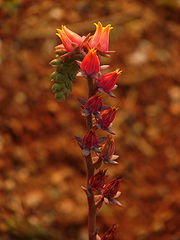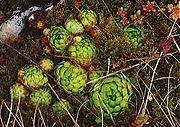
Crassulaceae
Encyclopedia

Dicotyledon
The dicotyledons, also known as dicots, are a group of flowering plants whose seed typically has two embryonic leaves or cotyledons. There are around 199,350 species within this group...
s. They store water in their succulent leaves. They are found worldwide, but mostly occur in the Northern Hemisphere
Northern Hemisphere
The Northern Hemisphere is the half of a planet that is north of its equator—the word hemisphere literally means “half sphere”. It is also that half of the celestial sphere north of the celestial equator...
and southern Africa
Africa
Africa is the world's second largest and second most populous continent, after Asia. At about 30.2 million km² including adjacent islands, it covers 6% of the Earth's total surface area and 20.4% of the total land area...
, typically in dry and/or cold areas where water may be scarce. The family includes about 1,400 species in 33 genera.
No member of this family is an important crop
Agriculture
Agriculture is the cultivation of animals, plants, fungi and other life forms for food, fiber, and other products used to sustain life. Agriculture was the key implement in the rise of sedentary human civilization, whereby farming of domesticated species created food surpluses that nurtured the...
plant, but many are popular for horticulture
Horticulture
Horticulture is the industry and science of plant cultivation including the process of preparing soil for the planting of seeds, tubers, or cuttings. Horticulturists work and conduct research in the disciplines of plant propagation and cultivation, crop production, plant breeding and genetic...
; many members have a bizarre intriguing appearance, and are quite hardy, typically needing only minimal care. Familiar species include the Jade plant
Jade plant
Commonly known as jade plant, friendship tree, lucky plant or Money Plant, Crassula ovata is a succulent plant with small pink or white flowers. It is native to South Africa, and is common as a houseplant worldwide...
or "friendship tree", Crassula ovata and "Florists' Kalanchoe
Kalanchoe blossfeldiana
Kalanchoe blossfeldiana is a commonly cultivated house plant of the genus Kalanchoe. They are succulent plants and can grow up to 12". The flowers consist of four petals and can be red, purple, orange, yellow and white and the plant flowers in the winter months.-External links:*...
", Kalanchoe blossfeldia.
Classification within the family is difficult because many of the species hybridize readily, both in the wild and in cultivation. Some older classifications included Crassulaceae in Rosales
Rosales
Rosales is an order of flowering plants. It is one of the four orders in the nitrogen fixing clade of the fabids and is sister to a clade consisting of Fagales and Cucurbitales. It contains about 7700 species, distributed into about 260 genera. Rosales comprises nine families, the type family...
, but newer schemes treat them in the order Saxifragales
Saxifragales
Saxifragales is an order of flowering plants. Their closest relatives are a large eudicot group known as the rosids by the definition of rosids given in the APG II classification system. Some authors define the rosids more widely, including Saxifragales as their most basal group. Saxifragales is...
.
CAM photosynthesis (Crassulacean Acid Metabolism) is named after the family, because the pathway was first discovered in crassulacean plants.
Genera
- AdromischusAdromischusAdromischus is a genus of easily propagated leaf succulents from the Crassulaceae family.Adromischus are endemic to southern Africa.The name comes from the ancient Greek "adros" et "mischos" .- Species :* Adromischus alstonii...
- AeoniumAeoniumAeonium is a genus of about 35 species of succulent, subtropical plants of the family Crassulaceae.The name comes from the ancient Greek "aionos" ....
- AichrysonAichrysonAichryson is a genus of about 15 species of succulent, subtropical plants, mostly native to the Canary Islands, with a few in the Azores, Madeira and Morocco, and one in Portugal.The species of Aichryson are not frost-resistant...
- Chiastophyllum
- CotyledonCotyledon (genus)Cotyledon is a genus of the Crassulaceae family. Plants in the genus occur in the Arabian peninsula and throughout the drier parts of Africa, but mainly in Southern Africa....
- CrassulaCrassulaCrassula is a large genus of succulent plants containing many species, including the popular Jade Plant, Crassula ovata. They are native to many parts of the globe, but cultivated varieties are almost exclusively from the Eastern Cape of South Africa....
- DiamorphaDiamorphaDiamorpha is a genus of family Crassulaceae. It is monotypic, including only the species Diamorpha smallii , an endemic of the southeastern United States. It becomes active in late fall and winter, blooms in late March, then dies. It has red succulent leaves that act to reflect light and hold...
- DudleyaDudleyaDudleya is a genus of succulent perennials, consisting of about 45 species in southwest North America.Many plants in the Dudleya genus were formerly classified as Echeveria....
- EcheveriaEcheveriaEcheveria is a large genus of succulents in the Crassulaceae family, native from Mexico to northwestern South America. The genus is named after the 18th century Mexican botanical artist Atanasio Echeverría y Godoy...
- GraptopetalumGraptopetalumGraptopetalum is a plant genus of the family Crassulaceae. They are perennial succulent plants and native to Mexico and Arizona. They grow usually in a rosette...
- Greenovia
- HylotelephiumHylotelephiumHylotelephium is a genus of family Crassulaceae. It includes about 33 species distributed in Asia, Europe, and North America.Species in the genus, formerly included in Sedum, are popular garden plants, known as "live-for-ever" or "orpine."...
- HypagophytumHypagophytumHypagophytum is a genus of family Crassulaceae. It includes only the species Hypagophytum abyssinicum, endemic to Ethiopia....
- JovibarbaJovibarbaJovibarba is a small genus of three species of succulents in the family Crassulaceae, endemic to mountainous regions in the southeastern quadrant of Europe. The genus is closely related to Sempervivum. Some taxonomists classify it as a subgenus of Sempervivum...
- KalanchoeKalanchoeKalanchoe , also written Kalanchöe or Kalanchoë, is a genus of about 125 species of tropical, succulent flowering plants in the Family Crassulaceae, mainly native to the Old World but with a few species now growing wild in the New World following introduction of the species.Most are shrubs or...
- LenophyllumLenophyllumLenophyllum is a genus of flowering plants in the orpine family, Crassulaceae. The roughly seven species it contains are distributed in Texas in the United States and northeastern Mexico. Some authorities place it in the genus Sedum. Plants in this genus are distinguished from Sedum species by the...
- MonanthesMonanthesMonanthes is a genus of small, succulent, subtropical plants of the Crassulaceae family. The about ten species are mostly endemic to the Canary Islands and Salvage Islands, with some found on Madeira. Its center of diversity is Tenerife, with seven species occurring on this island. On...
- Orostachys
- Pachyphytum
- Perrierosedum


- Phedimus
- Pistorinia
- PrometheumPrometheumPrometheum is a genus of Crassulaceae....
- Pseudosedum
- RhodiolaRhodiolaRhodiola is a genus of perennial plants in the family Crassulaceae that resemble Sedum and other members of the family. Like sedums, Rhodiola species are often called stonecrops. Some authors merge Rhodiola into Sedum....
- RosulariaRosulariaRosularia is a genus of family Crassulaceae. It includes about 35 species from Europe and northern Africa....
- SedumSedumSedum is a large genus of flowering plants in the family Crassulaceae, members of which are commonly known as stonecrops. It contains around 400 species of leaf succulents that are found throughout the Northern Hemisphere, varying from annual and creeping herbs to shrubs. The plants have...
- Sempervivum
- ThompsonellaThompsonellaThompsonella is a genus of family Crassulaceae. It includes about eight species endemic to Mexico....
- TylecodonTylecodonTylecodon is a genus of plants in the family Crassulaceae. Until the late 1970s all these plants were included in the genus Cotyledon, but in 1978 Dr Helmut Toelken of the South Australian Herbarium split them off into a genus of their own...
- UmbilicusUmbilicus (genus)Umbilicus is a genus of over ninety species of flowering plants in the family Crassulaceae. Many of its species have been given synonyms under different genera such as Rosularia, Cotyledon, and Chiastophyllum...
- VilladiaVilladiaVilladia is a genus of family Crassulaceae. It includes about 25 to 30 species distributed from Texas to Peru.-Synonyms:Altamiranoa was a genus of the Crassulaceae, that Joseph Nelson Rose proposed in the early 1900's for 12 Mexican species, three described as new and nine formerly in Cotyledon,...

